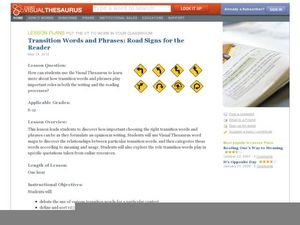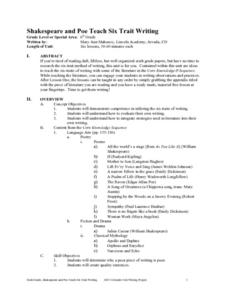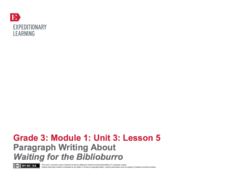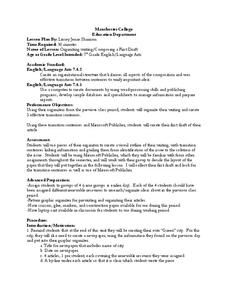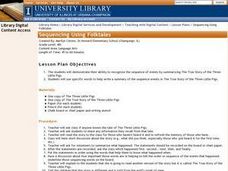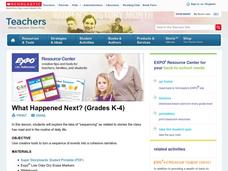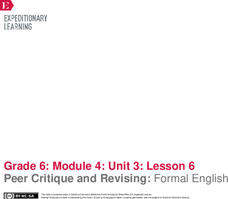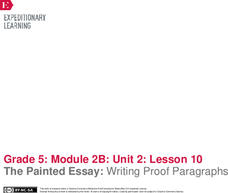Curated OER
Making an Argument: Effective use of Transition Words
Work on using transition words in context by prompting elementary and middle schoolers to write their own persuasive essays using transition words. They explore new forms of transition words and examine how they are used in an editorial...
Curated OER
Transition Words and Phrases: Road Signs for the Reader
Therefore! However! Furthermore! Explore the power of transition words and phrases. Signal your readers by suggesting the relationship between different thoughts or points. Help them demonstrate an understanding of word relationships.
Curated OER
Shakespeare and Poe Teach Six-Trait Writing
A Six-Trait Writing instructional activity helps your middle schoolers liven up their word choice and shows them how to evaluate their own writing. Class members take a close look at the language used in poems by Shakespeare, Kipling,...
Curated OER
Transition Words in Expository Writing
Create to learn! Your class can create posters of transitional words and phrases to help them compose an explanatory text. They work in groups and focus on one type of transition (time, place, importance, etc.). They also create a poster...
EngageNY
Paragraph Writing About Waiting for the Biblioburro
Ask your learners to synthesize what they know about Waiting for the Biblioburro by writing a well-organized paragraph. Young writers focus on using transition words and including specific details in their paragraphs. The plan allows for...
Curated OER
Organizing Writing/Composing a First Draft
Does your language arts class have a hard time with writing transitions? Use this organizational writing lesson to create three effective transition sentences that middle schoolers will use in their research of renewable resources.
EngageNY
Writing the Argument Essay: Moving from Planner to Drafting
It's an easy transition. Scholars identify transition words in the Pygmalion model essay and record definitions in the Transitions anchor chart. They then begin to look at the tone of the model essay. Finally, individuals begin writing...
EngageNY
Revising the Newspaper Article: Sentence Structure and Transitions
Take two. After a mini lesson covering sentence structure and transition words, scholars revise their End of Unit 3 Assessment based on feedback. Writers self-score their assessments against row three in the Newspaper Article Rubric.
EngageNY
Our Group Readers Theater: Managing the Sequence of Events in Our Script
Go with the flow. Scholars learn how using transition words and phrases helps their scripts flow smoothly. Readers think about connecting each section after determining the sequence for their readers' theater manuscripts from To Kill A...
EngageNY
Whole Class Model Letter Writing: Organizing Reasons and Evidence and Using Transition Words
Where's the evidence? Scholars practice ordering the evidence and reasons for their class opinion papers by physically sorting them. Next, they work collaboratively to write a body paragraph, using linking words to connect their ideas...
EngageNY
The Painted Essay for Opinion Writing: Developing a Conclusion and Adding Linking Words
Let's get colorful! Scholars use the Painted Essay technique to analyze and color code the conclusion of a model essay. Working in small groups, pupils then write a conclusion paragraph for their draft editorials about offshore drilling.
Curated OER
Transition Words in Writing
Transition words in writing are the focus of the language arts lesson presented here. In it, learners cut out the word-sort cards (embedded in the plan), and put them into four categories: time, examples, space, and summary. They find a...
Curated OER
Order! Order!
Polish organization skills in your youngsters. With this lesson, they are introduced to the trait of organization and participate in activities that reinforce organization. They cut apart a familiar story, receive different parts of the...
Curated OER
Compare Two Versions: Folk Tales, Sequencing, and Summary
Compare two versions of "The Three Little Pigs" (traditional and Jon Scieszka's The True Story of the Three Little Pigs, told from the wolf's point of view). As your 4th graders recount the familiar version of the story, emphasize the...
Curated OER
More Details and Transitions
Use details and transition words to enhance writing. Sixth graders examine their own writing and insert more details and transition words provided by their teacher. There is a list of 11 "Terrific Transitions," but brainstorm several...
Scholastic
What Happened Next? (Grades K-4)
Explore the structure of narrative writing with this fun, collaborative lesson. Start by reading aloud a short story, asking small groups of learners to fill in key events on a large story board prepared on the class whiteboard....
EngageNY
Peer Critique and Revising: Formal English
Dear Sir or Madam: What's the difference between formal and informal language? Scholars focus on using formal English and transitions in their position papers. After revising their rough drafts, they engage in the peer editing process...
Curated OER
Adventure Writing: Oregon's Landscape as a Setting
Students identify geographical features of different regions encountered by migrants on the Oregon trail. Students research how the Oregon landscape may have affected life and 19th century westward migration. Students write a narrative...
Curated OER
Foods
Students identify what types of items are grown on a farm. They discuss how those items are processed and turned into food they everyday. They are to write a paragraph using transition words.
Curated OER
How to Write an Essay: Secondary ed.
Whether introducing the structure of expository essays or reviewing the format with your high schoolers, take the time to check out this resource. Examples of seven common forms of introductory paragraphs and six types of conclusions, as...
Curated OER
The Beginning, The Middle, & The End
Cut magazine pictures into three sections, having your youngsters piece the pictures back together. With this fun activity, they discover the importance of sequencing a story. Then they use a fun template (shaped like a burger) to write...
EngageNY
Storyboard Revision: Managing the Sequence of Events and Using Sensory Details
Mastering techniques from the resource, pupils give life to their writing, revising their storyboards to include sensory details and transitions. To finish, they participate in a peer critique process and use the feedback to further...
EngageNY
Writing Dialogue: Revising Historical Narrative Drafts to Add Dialogue
Young writers have written, revised, and peer-edited their historical fiction narratives by the 10th lesson plan in a language arts unit. Fourth graders finally combine their revision notes to create a second draft. The double-spaced...
EngageNY
The Painted Essay: Writing Proof Paragraphs
Words of proof. Learners continue coding The Electric Motor by marking the first point in yellow and the second point in blue. They discuss the structure of the paragraphs by identifying transition words and evidence to support the given...



